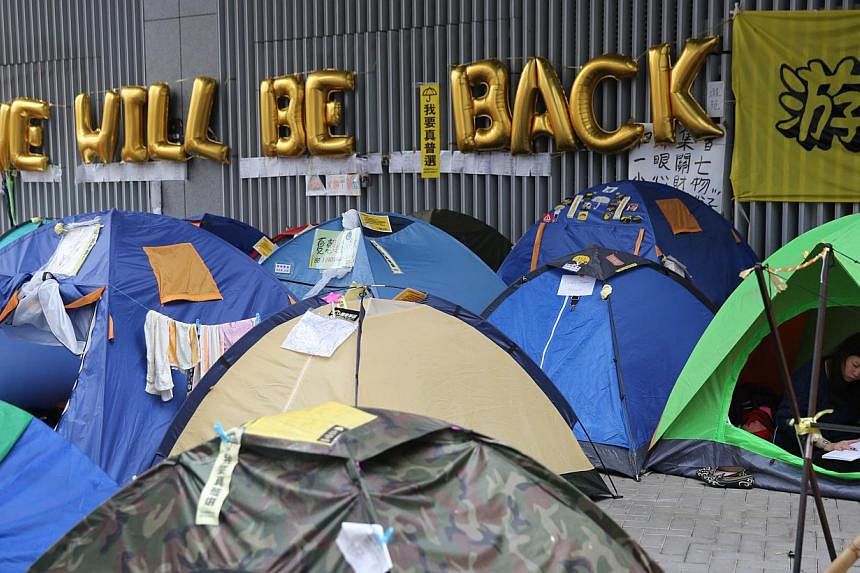ON WEDNESDAY night, PhD student Ricci Yue, 27, took a final stroll around the Admiralty protest site with friends, bidding farewell at favourite spots such as a polling booth he had helped set up.
He packed up the blue tent that he slept in the past 75 days.
And on Thursday morning, he threw away the toothbrush and other toiletries he had been using.
It is time to go home.
"I feel sad and nostalgic," he tells The Straits Times. "But now, we need to plan for the next step of our movement."
Nearly 11 weeks after hundreds of thousands of protesters first flooded Harcourt Road, the Occupy movement is ending. Dozens of protesters and their supporters are detained on Thursday, even as the Admiralty protest site is being demolished.
It had made history. But it had also failed in achieving what the protesters wanted - concessions from Beijing and the Hong Kong government for the people to have a greater say in how they choose their leader.
Says marketing officer Amy Lai, 26: "It is a little sad that it is ending now, and it is even sadder than we cannot achieve what we proposed at the very beginning - genuine universal suffrage.
"And what terrifies me most is that I do not think a protest of this scale can be staged anymore as the police will be better prepared in future
"What can Hong Kongers do in future? Why is it so hard?"
The protesters were roused to action by a decision by Beijing on Aug 31. It lays down stringent parameters for how Hong Kongers can elect their chief executive in 2017, which effectively mean Beijing decides who gets to run.
Those in the "pro-democracy" camp denounce this as "sham universal suffrage" while others say it is in accordance with Hong Kong's Basic Law.
While the city's mini-Constitution states that the "ultimate aim is the selection of the Chief Executive by universal suffrage upon nomination by a broadly representative nominating committee in accordance with democratic procedures", there are conflicting definitions of what "broadly representative" and "democratic procedures" mean.
As the protesters blockaded roads in Admiralty, Mong Kok and Causeway Bay, they demanded that Beijing's decision be quashed. They also called for the constitutional reform process to be restarted and for Chief Executive Leung Chun Ying to step down, saying his government misrepresented the people's views in a report to the central authorities.
None of these came to fruition. An initial round of talks between the government and the students yielded little, with the latter refusing to accept some concessions the former had offered. The government then shut the door on future dialogue.
Retired accounting clerk Wini Tsang, 58, sighs and her eyes redden as she considers the question of when she thinks Hong Kong can have "genuine universal suffrage".
"It is very difficult, and I don't think I can see it before I die."
But some of her younger counterparts are more hopeful, making plans for how they intend to carry on their fight.
On the eve of the clearance operation, thousands gathered at the site in a spirit of camaraderie, to say goodbye to a movement that, as Mr Yue puts it, "has changed Hong Kong".
"And there is more for us to do," he says. For instance, some of his friends are discussing forming community organisations to spread their messages, while he will be contributing articles to the new media.
Social worker K.C. Lau, 24, brought her guitar, and together with other protesters, sang the songs that inspired them over the past 11 weeks, including Canto-rock band Beyond's Under a Vast Sky, which became the movement's unofficial anthem.
She is mulling publishing a book or an online magazine filled with the stories of "how ordinary Hong Kongers fight for democracy".
University student Antony Ho, 21, says he will "share my experience with others who have not been woke up and if there will be an Occupy movement again, I will be sure to come back."
While the civil disobedience campaign laid bare - and exacerbated political fissures - in the wider society, for many of the protesters, it was one that united them in a common cause.
For some, it also represents an epiphany - both on a personal and societal level.
Says Ms Lau: "It has taught me a lot.
"I had little idea about 'democracy' or 'universal suffrage' before, but I realised that the unfairness and many other problems in our society are caused by our political systems."
"And I realised that actually there are many Hong Kongers who care about others. The majority of our people are not indifferent and care only about money. I am very thankful.
"I will miss these past 74 days."

